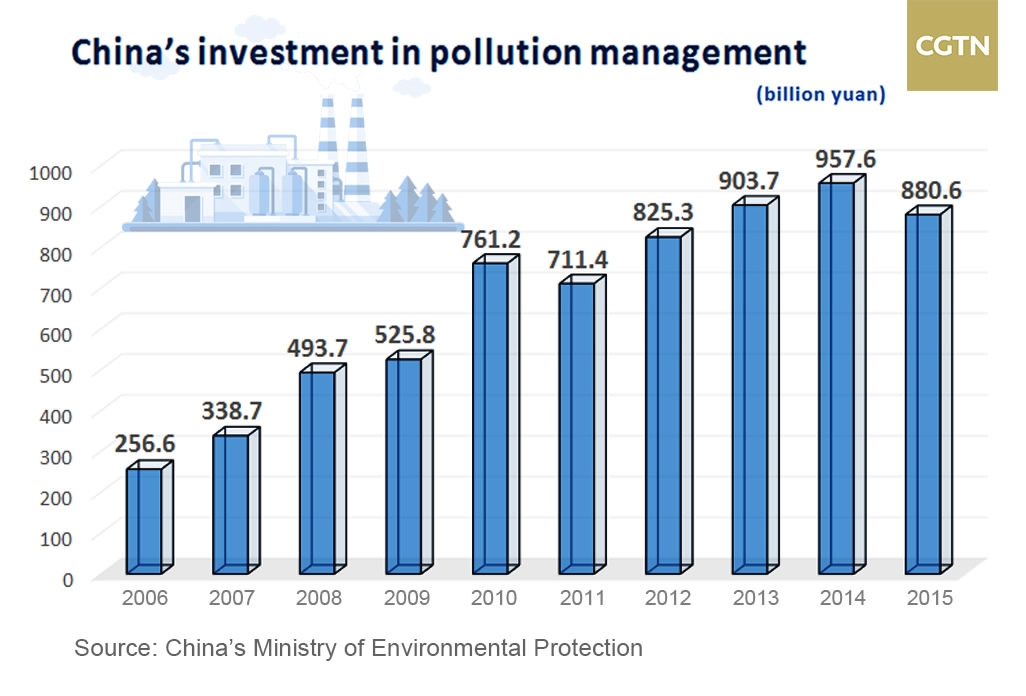
Business
12:04, 20-Dec-2017
Taxing Task: China’s fight against pollution – matching development with quality
By CGTN's Yang Jing

The Central Economic Work Conference started in Beijing on Monday, with the fight against pollution set to be a major discussion point as the world’s second largest economy pivots away from previous development patterns.
China has accounted for 30.2 percent of the world’s economic growth in the past five years, more than the US, Eurozone and Japan combined, according to the United Nations 2018 World Economic Outlook.
However, China has paid the price for its breakneck economic growth, with severe air, ground and water pollution across the country.
In 2016, just a quarter of China’s 338 cities met national air quality standards, according to data released by the Ministry of Environmental Protection earlier this year.
A tough battle that demands commitment
“Preventing major risks, targeted poverty alleviation and pollution control” are three major areas that should be addressed in 2018, according to a document released after the Political Bureau of the Communist Party of China (CPC) Central Committee met earlier this month.
Air quality control has been one of China’s key targets in 2017, with the government setting out a strategy of replacing fossil fuels like coal with electricity and gas in more than three million households, with the aim of achieving a “significant drop” in PM2.5 levels in key areas.

The battle against pollution is far from easy.
For instance, widespread industrial cuts and measures to move to natural gas for heating have given northern China successive days of blue skies this winter, but there are signs of a knock-on effect on economic growth and a struggling gas supply.
Official data showed industrial output in November had slowed, as steel factories were forced to cut production.
Some areas of northern China’s Hebei Province encountered gas shortages in November, leaving some regions with poor heating as temperatures plummeted.
The government’s commitment to controlling pollution has also meant tougher regulations on the business sector.
Gan Jie, a finance professor at Cheung Kong Graduate School of Business, told a 2017 economic review forum in Beijing last month that a survey of small and medium-sized companies showed Chinese business owners have grown increasingly concerned about environmental costs.
In a recent note, Julian Evans-Pritchard of Capital Economics estimated the aggressive crackdown on pollution "would shave just short of half a percentage point off GDP growth" for the final quarter of this year and the beginning of 2018, AFP reported on Monday.
But Chinese authorities are ready to take on the challenge of ensuring quality development in the long-term.
China should firmly reject any development model that damages or even destroys the environment, and abandon practices that boost short-term economic growth at the cost of the environment, Xi Jinping, General Secretary of the CPC Central Committee, said during the CPC Political Bureau Central Committee meeting this month.
Being held to account
To hold polluters accountable, a proposed reform will be initiated from next year, forcing polluters to repair the environment or pay compensation.
The proposal on ecological damage compensation was jointly launched by the general office of the CPC Central Committee and the State Council on Sunday, upgrading an earlier pilot compensation proposal from 2015.
In the past two years, there have been 27 compensation cases in seven of the provinces that have adopted the pilot scheme, with 400 million yuan (60.6 million US dollars) paid out in total, China National Radio reported on Monday.
According to the pilot scheme, individuals or companies that cause environmental damage should help restore the environment.
If the damage is beyond the point of restoration, they must pay for losses, a process managed by local authorities as untaxed revenue.
This new upgraded version of the scheme improves the process of claiming for compensation, compensation standards as well as the negotiation mechanism.
The Ministry of Environmental Protection will also work to develop an environmental damage assessment system and regulate the assessment process.

SITEMAP
Copyright © 2018 CGTN. Beijing ICP prepared NO.16065310-3
Copyright © 2018 CGTN. Beijing ICP prepared NO.16065310-3